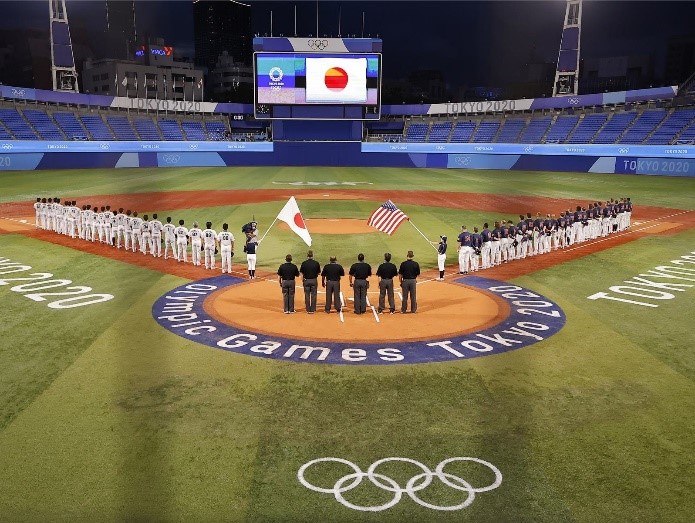Japan aims to stay atop Baseball World Rankings, help lead the sport into the future

One month ago, Japan rejoiced as they beat USA to win baseball gold at the Tokyo 2020 Olympic Games. In memory of this achievement, the second part of the WBSC's 'Federation Focus' special edition is dedicated to the Baseball Federation of Japan and celebrates the Samurai Japan National Team's Olympic gold medal.
On this day one month ago, Japan celebrated winning its first ever Olympic gold medal in the sport of baseball. And now, the Baseball Federation of Japan (BFJ) wants to use that success to stay atop and lead the baseball world into the future.
In the second part of the WBSC's 'Federation Focus' special edition, BFJ head of International Affairs and PR Atsushi Nagamata spoke to the WBSC about how the BFJ is ready to build on the Tokyo success.
"The Olympic Games are a great opportunity for the whole world to pay attention to baseball every four years," Nagamata said. "This has been a negative factor for Japanese baseball players, as baseball has not been an Olympic sport for the past two Olympics for a total of 13 years. In fact, the number of baseball players in Japan is declining, and the popularity of other sports is increasing. In such a difficult situation, being able to win the Olympic gold medal in the final against the United States, the country where modern baseball originated, is one of the most valuable achievements in Japan's history.
"Also, the achievement under the unprecedented pandemic is a historical milestone. We think that winning the gold medal this time served as a stepping stone to further lead the world baseball scene from here," Nagamata added. "The Baseball Federation of Japan has set one major mission, having our baseball programme at the top of the WBSC World Rankings".
Nagamata is a baseball man. He interned for various Major League Baseball (MLB) clubs and served during the World Baseball Classic 2009 while he completed a master's degree in Sports Administration in the United States.
The 39-year-old said Olympic gold has a particular meaning for BFJ. "The fact that many children turned their attention to baseball because we could win the gold medal at the Olympics will be an irreplaceable appeal for the promotion and development of the game. As with other Olympic sports, the Games exert the greatest power. It was irreplaceable to widely appeal to the fun and good parts of baseball to the next generation. It also has the meaning of being a great tailwind for future steady promotion activities."
All of the Japanese National Baseball Teams take the field under the name Samurai Japan. The professional National Teams are selected in collaboration with Nippon Professional Baseball (NPB). In May 2016, BFJ and NPB founded the Japan Baseball Council with five committees: Promotion and Popularization, Samurai Japan Strengthening, Marketing, Operations, International. "The goal was to get the Japanese baseball world to work together with an eye on the future," Nagamata said. "Professionals and amateurs cooperate to face common challenges."
The Samurai Japan Strengthening Committee aims to develop enough talent to select the best players and create a team that can always compete for victory in international tournaments. The national team players for the Olympics were selected after sufficient discussions between BFJ and NPB through the Samurai Japan Strengthening Committee.
And development is not only related to players. BFJ is very focused on developing baseball across all levels. "We are ready to launch clinics and workshops aimed at educating and developing coaches through a coach certification system, and we will be active also with umpire's clinics," added Nagamata, who is personally in charge of developing Baseball5.
The Japan Amateur Baseball Association (JABA) and the Japan Student Baseball Association (JSBA) established BFJ as the governing body of amateur baseball in Japan on 20 June 1990. The new organization was immediately recognized by the Japanese Olympic Committee (JOC), the International Baseball Federation (IBAF) and the Baseball Federation of Asia (BFA).
A previous attempt by the Industrial League (now JABA) and the JSBA led to the Japan Amateur Baseball Federation in 1954. That body selected the National Team that participated in the first Asian Baseball Championship in the Philippines. The Japan Amateur Baseball Federation was dissolved in 1966.
However, in order to participate in international tournaments, the two organizations reorganized the Japan Amateur Baseball International Committee in 1967 as a jointly operated liaison organization, and this committee continued until 1989.
Nowadays, BFJ comprises three main member organizations and represents most of all amateur baseball organizations in Japan. BFJ’s role is the development of domestic Japanese baseball, the strengthening of national teams, overseas exchanges in baseball and Baseball5. President Masatake Yamanaka leads a Board of Directors. Director Yuichi Hirano manages the day-to-day business in collaboration with secretary-general Yuji Nagakubo and his staff, including Nagamata.



